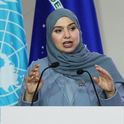The small UN observer force was isolated, and largely forgotten. Intelligence was weak, but reports were coming in of massacres, and of much worse things that could unfold in the coming months. Refugees, many of them bearing the scars of machete cuts, began to seek shelter around UN camps. So many, in fact, that there was a real threat of cholera. The security council, divided among itself by other conflicts, and tired of operations in Africa, was largely focused on other problems.
This much of the story describes two cases: Rwanda in 1994, which led to genocide, and Ituri in the Democratic Republic of Congo in 2003, which did not.
With Rwanda, it was not just that the warnings were not given proper attention by UN headquarters or member states. Much worse is what happened once the killings had actually begun. Western governments vigorously insisted that UN documents should not even use the word "genocide" to describe events. And, when the small UN force on the ground took casualties, governments called them home, leaving the genocidaires to themselves.
A decade later in Ituri, by contrast, a small UN reserve was inserted into Bunia, the centre of the crisis. It provided some support, and kept the airfields open for an emergency EU operation led by France. The French kept Bunia stable until the security council could assemble a stronger UN force, deploy it into Bunia, and then fan out into the countryside beyond.
There are caveats to this optimistic version of events in Ituri, of course. The first is that it isn't over. Even with 5,000 troops in the area, UN forces are heavily outnumbered by the local militias, and things could go wrong again. The UN is playing a delicate game - using enough force to show that it will protect civilians and create space in which the political process can develop, but not so much force that any of the factions feels that they have to commit themselves to a fully fledged war against the UN.
Another point is that there were important differences between the Rwanda genocide and the Ituri situation. The Rwanda genocide had an organisational infrastructure that was not matched in Ituri. The scale on which weapons were stored and distributed was different. The drumbeat hate propaganda of Radio Mille Collines had no counterpart in Ituri. Even the ethnic equation was less conducive to genocide - in Rwanda the majority turned on the minority; in Ituri all communities are in a minority. Most important of all, even with tension running high in the UN security council, the international community was able to do the right thing in 2003.
Those who defend the UN and the governments involved - or not involved - with Rwanda's genocide, point out that the international landscape was not conducive to effective response. The council was divided over whether or not to intervene militarily. The Americans had been stung by their disastrous recent intervention in Somalia. Attention was focused on the elections in South Africa, where people were expecting the worst.
Yet the international environment in 2003 was also difficult. The cycle of massacres in Ituri began in March, with the start of the withdrawal of Ugandan troops. At almost exactly the same time, and to the exclusion of everything else in the international media, the US was preparing to present its draft resolution on the use of force in Iraq. And on 11th March, President Chirac told the French public that "la France votera 'Non'" opening not only a difficult period for US-French relations, but also for the US-UN relationship.
But when Kofi Annan called Chirac at the beginning of May and asked him whether France would be willing to put a force into Ituri at short notice, the French agreed, provided that both the EU and the UN security council were firmly engaged. By the end of the first week in June, under the umbrella of the EU and with a vote of the security council, the French were on the ground in Bunia. A few weeks later the US and France came together again over a resolution to stem the civil war spiralling out of control in Ivory Coast.
The European experience in Bunia may have created momentum towards a much more ambitious project - one that may be a further step towards preventing future genocides. The British government, with the French, Germans and others, plus the support of the Irish presidency of the EU, are pushing for a standby European force to support UN operations in Africa and elsewhere.
The proposal is that a group of nations, acting under the EU umbrella, should be able to deploy seven to nine battle groups - each of up to 1,500 men - with two weeks' notice, and be able to keep them in the trouble spot for periods of up to four months. Three possible formats are envisaged: one EU country deploying alone; one country agreeing, as the French did in Bunia, to serve as the "framework nation"; or a more broadly multinational format.
The idea of a standing force has always been the dream of UN peacekeepers. The theory goes that the everybody-on-board decision-making processes that give the UN its legitimacy also trip it up at the military sharp end. It is hard to move quickly, move in sufficient force, or provide the coherent command and control arrangements that make the troop contributors feel that their troops are safe and well used.
The EU force would not be a UN standing force, but it would have a similar function. It would be built around the few countries that have the capacity to deploy troops quickly and over big distances. And its existence would lend some deterrent capacity that a light UN presence on the ground so often lacks.
This concept needs to be tested to see its full measure. But the Bunia experience was positive, as was the British intervention in Sierra Leone in 2000, when a small force of British troops was able to provide vital support to a UN mission until a new international force was ready to take over.
Even though it is not envisaged that the EU force will be fully operational until 2007, one possible early test for the expanding UN-EU partnership could be in Sudan. After a 21-year civil war that has caused almost 2m deaths, a peace agreement in that country might now only be weeks away. If peace comes, and if a peacekeeping mission is established, then a European rapid reaction force might be able to send a message of security that scattered units of UN military observers could not send alone.
There has been no epiphany. Genocide, and genocide ignored, remains a real possibility a decade after Rwanda. But if genocide is a little less likely today than it was a decade ago, it is thanks to a few small steps in several different areas.
The security council may be more willing to act than it was before. National concerns continue to dominate, as they always will, but there is no obvious taboo any more against even using the word "genocide." The Europeans are coming forward with the military plans described above. And generally, throughout the international community, there may be a growing acceptance of "the responsibility to protect" - that is, the responsibility, in the first instance, of governments to protect their own people from harm, and, beyond that, the responsibility of the world at large to protect civilians in other countries.
There is also an effort to establish legal accountability for grave breaches of international humanitarian law, in the international criminal tribunals for the former Yugoslavia and for Rwanda, and now with the international criminal court. The message may be spreading slowly, but it is spreading: those involved in genocide will be brought to justice. Even in Ituri, word is spreading that the prosecutor of the new court is following events there.
And UN peacekeepers themselves are better equipped than they were. Countries have led a three-year reform effort, known as the "Brahimi process," to enable UN peacekeepers to deploy more quickly and effectively than in the past. The changes are incremental, but real. Strategic stocks of equipment are now held at a facility in Brindisi, ready for short notice deployment anywhere. Quick finance is now available for the start-up phase of UN missions.
Peacekeeping doctrine, too, has evolved over the last decade, under the rubric of "robust peacekeeping." This new doctrine empowers UN forces to use force not only to defend themselves, but to defend their mandate, and to extend what protection they can to local civilians - as they now do in Ituri.
None of these things alone is going to prevent a truly determined genocidal effort. It is not a mandate or doctrine, but actual military capacity, that will largely make the difference in trying to protect civilians from slaughter. And none of these things will create political will among those countries with the capacity to act in the face of genocide. But, taken together, they may show that genocide is a bit harder to get away with now than it was in April 1994.












